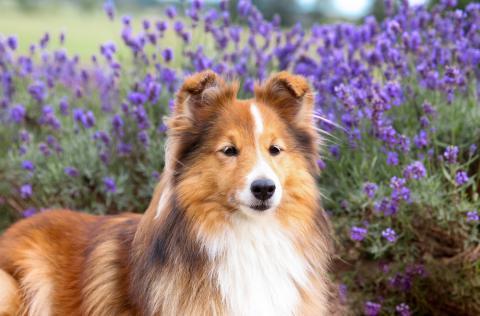
Our four-legged friends feel tension and nervousness just like we do. And some of the same botanical allies that work for us may help them, too. Three of the most popular calming remedies for us bipeds are also safe for your pooch when she’s having an off day: chamomile, valerian, and passionflower.
Chamomile
Peter Rabbit’s mother had it right. There’s nothing like some chamomile tea after a stressful day. Chamomile (Matricaria recutita) is a popular ingredient in many commercially-available calming dog chews. Chamomile can help with…
- irritability (for example, a snappy old dog)
- hyperactivity (the “super spaz” dog that won’t settle down)
- anxiety, fear (especially if this is putting them off their food or causing digestive upset)
Passionflower
Passionflower (Passiflora incarnata) is lovely for dogs with separation anxiety. I temporarily took in a super sweet dog that appeared to be lost after he hung around the yard for a couple hours. He looked like he’d been outdoors for a long time. Luckily, he had a collar with a tag that listed a local vet, though no owner information. I called the vet to have them reach out to the owner. While waiting to hear back, I went into town for an hour or so. The owner called while I was out and warned me to, under no circumstances, leave the dog alone in the house because of separation anxiety. He did, indeed, try to eat his way out of the house. To this day, I wonder if a little passionflower would have spared all my window frames. Try passionflower to help with…
- separation anxiety
- fear-based aggression
- acute situations (do not use as a life-long tonic)
Valerian
I used this for my old lab mix, Zoe. She was suffering from acute dizziness…staggering around with the characteristic head tilt of a vestibular disturbance (the part of the inner ear that regulates balance). The vet confirmed that she did, indeed, have “Old Dog Disease,” as this is sometimes called. Zoe was pretty distressed, panting, and unable to relax. Valerian (Valeriana officinalis) did the trick and she would calm down and curl up on her bed rather than stagger around and pant. Valerian can help with…
- anxiety from thunderstorms, nail clipping, vet trips, and other acute situations
- tension from pain or discomfort
- irritability
How do you use herbs for your dog?
You can use herbs as a tea. Tea can be made ahead of time and stored in the fridge for up to a few days. Or use freshly ground herb powder. You can grind multiple doses-worth, just be aware that well-stored powdered herbs only maintain their activity for a few months.
I use regular old liquid extracts for my dogs. I’m not worried about the small amount of alcohol they’re getting. Folks who want to avoid alcohol in their pets can use glycerites instead (plant extracts made with vegetable glycerin). These will taste sweet, making canine compliance better if you’ve got a picky pooch.
You can add any of these to your dog’s food or, in the case of liquid extracts or glycerites, to a treat. Any of these preparations can be added to the water bowl, though dosing is harder to control and picky dogs may not want to drink water spiked with not-so-tasty bitter herbs like valerian. Also, not all herbs that are safe for dogs are safe for cats, so if there are cats in the house that share the water bowl use another dosing method.
How much herbal medicine do you use for your dog?
The rule of thumb many herbalists use is to divide the weight of an “average” human (150 lbs.) by your dog’s weight. Use the resulting “dilution factor” to divide into the normal human dose. Say you want to use chamomile tea for your 50-pound lab retriever. 150 pounds divided by 50 pounds equals 3. A reasonable human dose of chamomile tea is 1 cup (8 oz). 1 cup divided by 3 is 1/3 of a cup (or 2.7 oz) for the dog.
Parting Notes
As you would do for yourself, be sure to use good quality herbs from reputable sellers. Otherwise, the herb might not be effective. In the worst case, the herb might not be what the label says. Also, if your dog is on many meds, talk to your vet or even a pharmacist or local herbalist before adding in an herb.
Here is some more information on how anxiety presents in dogs and some additional support for your furry friend. Like herbs for people, you may have to experiment with different calming herbs for your dog. For instance, chamomile didn’t faze my lab mix Zoe when she got into anxiety mode (usually on car rides)…she’d keep panting and would remain standing the whole trip. Valerian was the ticket instead.
Further Reading
- Tilford, G & ML Wulff-Tilford (1999) All you ever wanted to know about herbs for pets. BowTie Press, Irvine, CA








